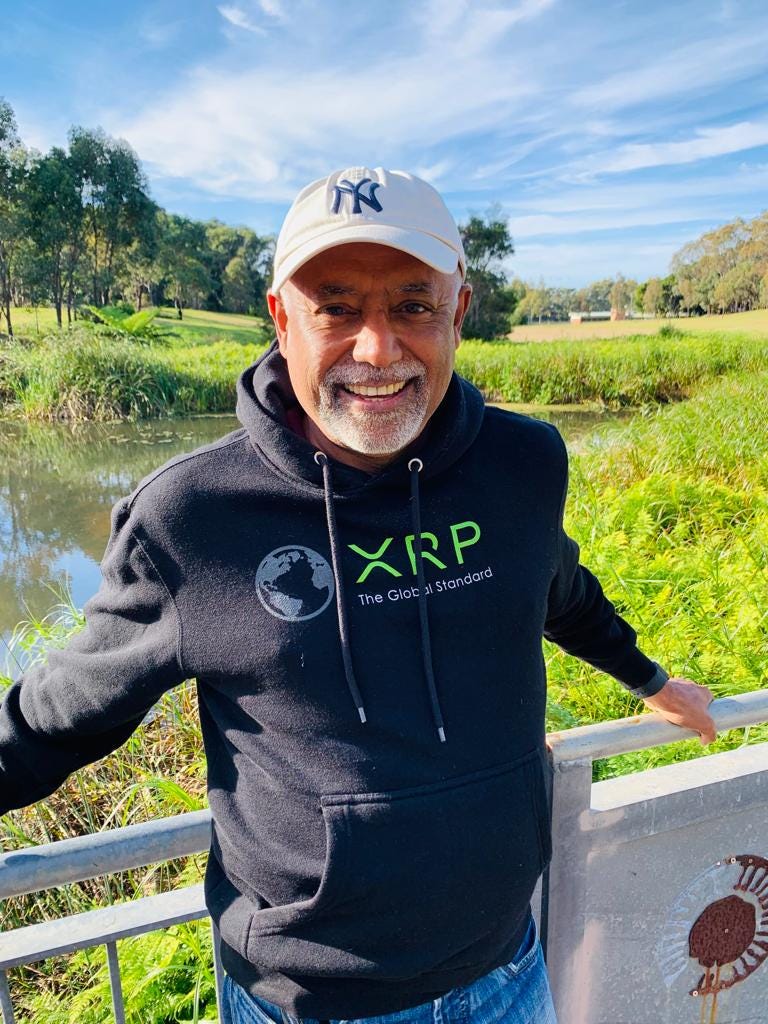It has been nearly three years since I began writing about one particular cryptocurrency among the thousands out there. While I have explored and invested in other intriguing projects, this particular digital currency stands out. My belief and confidence in this venture are so strong that I proudly sported a hoodie emblazoned with its name.
When it comes to attention, controversy, animosity, and adoration, no other crypto has garnered as much as this one, apart from Bitcoin, with its enigmatic origins.
Let me begin by stating that throughout history, major changes have been ushered in by the introduction and adoption of revolutionary technologies. We witnessed this with electricity, steel, oil, and the internet. Now, we find ourselves in the era of autonomy. What does this mean exactly?
Blockchain technology is the groundbreaking force that underlies everything developed by cryptocurrencies. It enables the creation, processing, storage, and transfer of value without requiring human intervention. Artificial intelligence (AI), robotics, and the Internet of Things (IoT) are the key branches set to thrive under this technology. Unlike previous technological shifts, this one presents a complex and challenging path to achieve global acceptance, regulatory clarity, and institutional adoption. However, rest assured that all obstacles will eventually be overcome.
As with any emerging technology, it is those who possess foresight and vision that will reap the greatest benefits. Education is of utmost importance in gaining the confidence and conviction necessary for investment decisions.
The current landscape mirrors what transpired during the late 1990s with the dotcom bubble and the internet revolution. However, there is a notable difference: the regulatory framework today is considerably more hostile. Authorities are less receptive to innovation, and the financial industry is pushing back against the inevitable progress. The regulators' understanding of the technology lags far behind its rapid development, creating a significant disconnect.
The internet revolution spawned all trillion-dollar companies, except for two state-sponsored oil giants. Nevertheless, even esteemed Nobel Prize-winning economist Paul Krugman famously proclaimed in 1998 that "by 2005 or so, it will become clear that the internet's impact on the economy has been no greater than the fax machine's."
Ultimately, success hinges upon one's ability to develop a comprehensive understanding of the technology and its global implications. In the past decade, three current trillion-dollar companies could have been purchased for a mere $5 per share: Amazon, NVIDIA, and Tesla. The opportunity was there for retailers; they simply failed to recognize it.
Consider the journey of Amazon, which started as an online bookstore in 1995 and has since become a household name synonymous with global online delivery, cloud computing, and streaming media. I see similar possibilities for XRP, the most robust and tightly run ship in the crypto world. Notably, they recently added Warren Jenson, the former CFO of Amazon and Delta Airlines, to their board, appointing him as the head of their audit committee. Other board members include illustrious figures such as Rosie Rios, the former treasurer of the US government under President Obama, Sandie O'Connor, former regulatory affairs officer of JP Morgan, and Michael Warren, a managing director at Albright Stonebridge Group, among others. The inclusion of such accomplished individuals suggests a profound belief in Ripple's mission.
Ripple has dedicated over $200 million to fight an ill-conceived case brought forth by the SEC, a case that lacks merit. No company would commit such substantial resources to a legal battle if it didn't have unwavering faith in its cause. Moreover, this protracted legal battle has laid bare the corruption within the SEC and called into question the credibility of its leadership. Amidst all this turmoil, Ripple managed to acquire the prestigious Swiss crypto custody firm Metaco for an all-cash sum of $250 million. Take a look at Metaco's client list, and you'll quickly realize the significance of this acquisition.
The upcoming 13th of June holds great importance in this case, as Judge Torres has authorized the release of the highly anticipated Hinman emails to the public. These emails are expected to expose the hypocrisy and deceitfulness of the agency, further undermining the SEC's position. Coincidentally, on the same day, the U.S. Financial Services Committee, led by Patrick McHenry, will introduce a bipartisan bill titled "The Future of Digital Assets." This aligns with several other crypto-related events occurring between the 12th and 14th of June, events that demand our attention. Additionally, the FedNow instant payment service is set to launch in July. Although not a central bank digital currency (CBDC), it could serve as a pilot service before the full implementation of a CBDC. Approximately 120 countries worldwide are working on some form of CBDC, and Ripple is believed to be collaborating with 30 or 40 central banks, although their involvement with Bhutan, Palau, Montenegro, and Hong Kong is the only information disclosed to the public. These countries hold strategic importance for major currency blocks or nations.
Take Bhutan, for example—a country with its own currency and autonomy, yet over 95% of its trade relies on transactions with India. India already has an active partnership with Ripple, implementing side chains on the XRP Ledger (XRPL). Montenegro, an obscure European country outside the European Union, utilizes the Euro as its native currency. Palau serves as a military base for the U.S., an independent country without its own central bank, but relying on the U.S. dollar. While the Chinese authorities strive to maintain Hong Kong's autonomy externally, the reality is that nothing happens in Hong Kong without China's knowledge. Ripple has recently launched a new payment platform for a central bank digital currency (CBDC) in Hong Kong. The platform is expected to showcase a real estate asset tokenization solution as part of the HKMA's inaugural e-HKD pilot program. Tokenization itself represents a multi-trillion dollar undertaking, much of which will flow through the XRPL ledger. Ripple's platform empowers central banks to create, distribute, redeem, and even burn their own CBDCs. Furthermore, it facilitates offline transactions and offers central banks the flexibility to issue CBDCs in both wholesale and retail capacities.
This practical alternative provided by Ripple's technology eases the burden on governments attempting to construct their own CBDC systems from scratch. Much like how governments and corporations rely on third-party enterprise-grade software to run their operations, it is far more efficient to leverage Ripple's superior technology.
Despite the ongoing lawsuit preventing Ripple from conducting active business in the U.S., they are actively involved in the FedNow project. Additionally, no other crypto garners as much attention from esteemed institutions as Ripple does. The IMF, BIS, the Digital Dollar Foundation, the Euro Digital Association, and the Digital Pound Foundation all prominently mention Ripple. It is the most traded crypto in South Korea, and by 2025, it is projected that all banks in Japan will be utilizing Ripple.
With the potential revelation of the emails or perhaps even prior to that, a settlement could be reached or already agreed upon. If Ripple achieves the regulatory clarity it seeks, it will emerge as the only crypto with such certainty among the multitude of digital assets in the universe. As I have emphasized before, regulatory clarity and institutional adoption serve as the crucial catalysts and recognition that digital assets require. The use cases of XRPL (XRP Ledger) are plentiful, ranging from on-demand liquidity and cross-border transactions to smart contracts, NFT creation, and carbon credits. Few, if any, other cryptos offer the same level of liquidity, speed, and low costs as XRP does.
For the past three years, the price of XRP has remained suppressed due to the SEC case. However, from a technical standpoint, all indications point to a major breakout. When that breakout occurs, prices will skyrocket like a kangaroo bouncing on a trampoline. In fact, among the top 100 cryptos, XRP has been the best performer this year.
If you received value from this post, and you’d like to send some back, or if you’d like to signal to me to continue spending time on these types of explorations, feel free to buy me coffees (thank you!):
So, there we go. Thanks for reading Breezy Briefings. If you enjoyed this, I'd really appreciate it if you could take a second and tell a friend. Honestly. It makes such a big difference.
Forward this email. Recommend the newsletter. Share on Twitter, WhatsApp, Telegram, LinkedIn, Slack, wherever!
Join Breezy Briefings’ Official Telegram Channel: https://t.me/BreezyBriefings
Abraham George is a seasoned investment manager with more than 40 years of experience in trading & investment and multi-billion dollar portfolio management spanning diverse environments like banks (HSBC, ADCB), sovereign wealth fund (ADIA), a royal family office, and a hedge fund.



